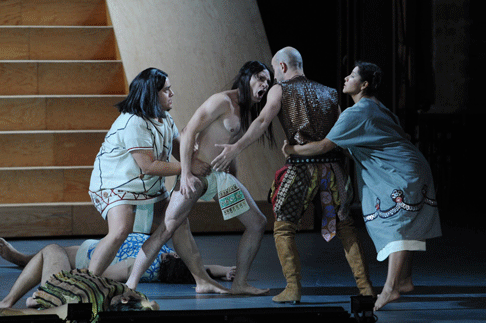Montezuma
was thus an obvious choice as the operatic centerpiece of the 2010
International Cervantino Festival, staged in Guanajuato, a major station on the
march to Mexican freedom that began in 1810.
Although he was his contemporary, Graun was no Handel, and thus
Montezuma, even when performed with the dedication obvious in the
production seen in the historic Teatro Ju·rez on October 14, is more
conversation piece than masterwork. The libretto by Graun’s employer,
Prussia’s music-loving, flute-playing Frederick the Great, was performed
in Guanajuato in Italian translation.
 Christophe CarrÈ countertenor as Panfilo de Narvaes
Christophe CarrÈ countertenor as Panfilo de Narvaes
The somewhat simplistic plot reflects Frederick’s desire to be seen as
an apostle of the Enlightenment — despite his own absolute power.
Montezuma is an embodiment of the monarch’s philosophical
leaning vis-‡-vis the Noble Savage. (Recall that this is also the age of
Jean-Jacques Rousseau, with Voltaire being in residence at Frederick’s
court.)
Mexico’s opera Wunderkind Claudio ValdÈs Kuri brought all the
excesses of Regietheater to the minimalist staging, trying too hard to
make more of Montezuma than is really there. Intent of fitting the
work into the theme of the season, Kuri employed all the techniques of
Brechtian alienation to combine in the production a picture of Mexico’s
inhuman suffering with a vision of hope for the future. Thus in the title role
countertenor Flavio Oliver frequently swapped Aztec loin cloth with T-shirt,
and in Act III Kuri changed the entire 26-member Elyma Ensemble, an able but
undistinguished early-music group, into “civvies” and moved them
onto the stage. This act concluded not with Graun’s original score, but
with a dramatic scene by Mexican Baroque composer Manuel de Sumaya. As
Montezuma died, half the stage was wrapped in a modern Mexican flag. The
substituted finale seemed to suggest an eventual and successful synthesis of
cultures. Yet one wondered— to cite only one from many examples—
whether CortÈs on-stage rape of heroic Montezuma did not detract from the
figurative rape of ancient Mexico that is the true subject of the Graun’s
opera.
Oliver, by far the finest voice— and actor— in the cast, was a
virile Montezuma in the minimalist staging, designed by Herman Sorgeloos. As
conqueror CortÈs Adrian’s George Popescu, an equally able countertenor,
was the embodiment of the Absolute Evil that brought about the end of Aztec
civilization.

As Montezuma’s mate, soprano Lourdes Ambriz grew in stature as she
suffered ever-greater abuse throughout the performance. She made her lament in
Act III a memorable moment in an otherwise often tedious evening of opera.
Without distorting the figure, Kuri took advantage of Ambriz’ talent to
bring a hint of feminist thought to the production. Gratefully, Kuri trimmed
his staging to three hours from the original four. It was also to Kuri’s
credit that he corrected Frederick’s idealist picture of Montezuma with
an opening scene that showed that his hands too were soiled with the blood of
innocent victims.
A co-commission Germany’s Theater der Welt and the Edinburgh Festival
(it was staged by both earlier this year), the Cervantino, Madrid’s
Teatro, where it recently played. It is yet to be seen in Mexico City.
Wes Blomster
image=http://www.operatoday.com/CCC_1231.gif
image_description=Flavio Oliver as Montezuma [Photo courtesy of Festival Internacional Cervantino]
product=yes
product_title=Carl Heinrich Graun: Montezuma
product_by=Flavio Oliver: Montezuma; Lourdes Ambriz: his wife; Rogelio MarÌn: Tezeucco; Lucia Salas: an Aztec general; Adri·n-George Popescu: CortÈs; Christophe CarrÈ: NarvÈs, a Spanish captain. Gabriel Garrido: conductor. Claudio ValdÈs Kuri: director. Herman Sorgeloos: scenic designer. Jimena Fern·ndez: costume designer. Carsten Sander: lighting. Elyma Ensemble. International Cervantino Festival. Teatro Ju·rez, Guanajuato. October 14, 2010.
product_id=Above: Flavio Oliver as Montezuma
All photos courtesy of Festival Internacional Cervantino